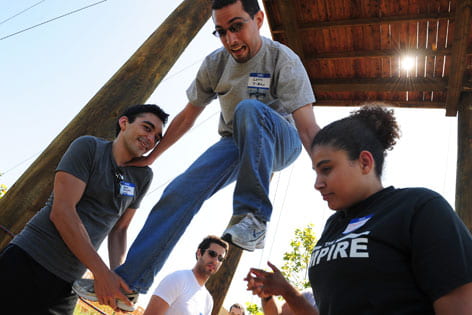Summer program lures diverse grad students
Increasing diversity among ranks of UC Irvine graduate students is goal of four summer research programs.

Maximiliano Sobrero is spending this summer in Orange County, but the New York University neurology student isn’t here for the sun and surf. Instead, he is working with UC Irvine neurology professor John Weiss, whose research on motor neuron degeneration could lead to breakthroughs in treating Lou Gehrig’s, Parkinson’s and Alzheimer’s diseases.
“It’s intense and very time-consuming, but the opportunities given to us here are very rarely matched anywhere else,” says Sobrero, who plans to eventually pursue medical and doctorate degrees.
Sobrero is one of 42 students from across the U.S. spending eight weeks at UCI immersed in research projects, skills seminars and community-building activities as part of the Graduate Division’s Summer Research Program for undergraduates and Competitive Edge Summer Program for incoming doctoral students.
Competitive Edge is administered through the UCI Alliances for Graduate Education and the Professoriate and is sponsored by the National Science Foundation. The Summer Research Program comprises four graduate school preparation courses that are open to undergraduate students and, in some cases, master’s degree candidates:
- Summer Undergraduate Research Fellowship
- University of California Leadership Excellence Through Advanced Degrees
- Alliance for Graduate Education & the Professoriate
- California Pre-Doctoral Program
“A typical day can mean attending a workshop in the morning, working in the lab all day and going to a GRE prep course at night,” says Sobrero, who is in the AGEP program. “It can be difficult, but it’s awesome. I get to collaborate with UCI students and lab technicians who are teaching me a lot. I hope the work I do here over the summer can help further Dr. Weiss’ research.”
Targeted to students from educationally disadvantaged backgrounds, the Summer Research Program draws applicants from around the country; many the first in their families to attend college. This year’s participants hail from more than a dozen states and such schools as Howard University and the University of Texas at El Paso, plus several University of California and California State University campuses. The goal of the program is to increase diversity among students who pursue advanced degrees leading to research or academic careers.
UCI provides students a research stipend and on-campus housing and pays their travel costs. Participants work full time in assigned labs for the entire eight-week program. Faculty make academic and research assignments, while a program coordinator meets regularly with students to monitor their progress. A slate of required workshops and seminars address such topics as time management and how to fund a graduate education, and an evening GRE prep course is also mandatory. Students submit research outlines, abstracts and final papers and will present their work at the Aug. 13 UCI Summer Research Program Symposium.
“Being part of this program is a great way for me to develop my research skills,” says Jessica Kizer, a sociology major at California State Polytechnic University, Pomona and SURF student. She is working on a book project with Jennifer Lee, an associate professor of sociology who studies race/ethnicity and immigration.
“The program is very fast-paced but really exciting,” Kizer says. “There are a lot of workshops that teach us about the grad school application process and what it’s like to be a grad student. My grad student mentor has been especially helpful. I ask her a ton of questions – there’s so much to learn.”
Raslyn Rendon, director of outreach, recruitment & retention for the Graduate Division, says the Summer Research Program is just one of many ways in which UCI helps develop tomorrow’s leaders in science, industry and academia.
“It gives us a wonderful opportunity to introduce UCI’s top-notch graduate programs, professors and facilities to a highly talented group of students who are passionate about pursuing an advanced degree,” she says.
The Competitive Edge Summer Program draws students from populations traditionally underrepresented in science, technology, engineering and math. It allows incoming UCI doctoral students to start their research early and present it at a symposium.
“The point of this program is to be a bridge,” says Rendon. “We want to make sure that by the fall, our Competitive Edge students know UCI and how to take advantage of campus resources so they can be successful here.”